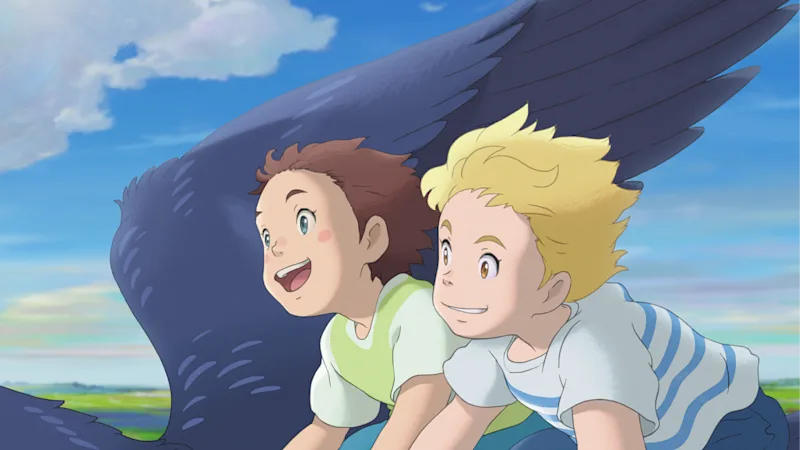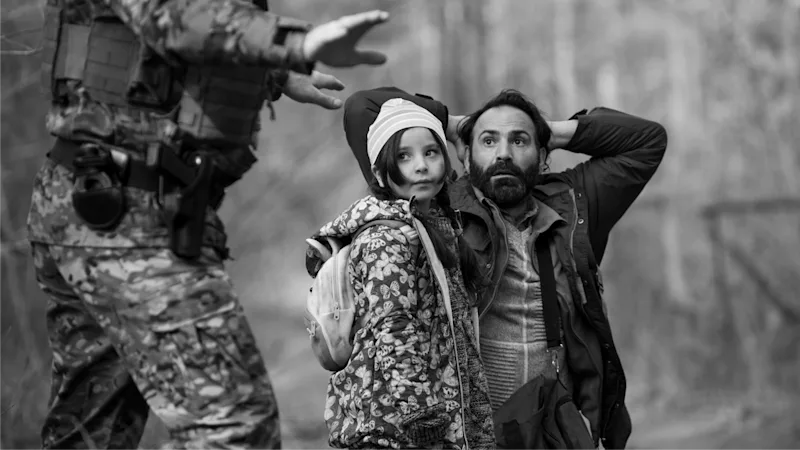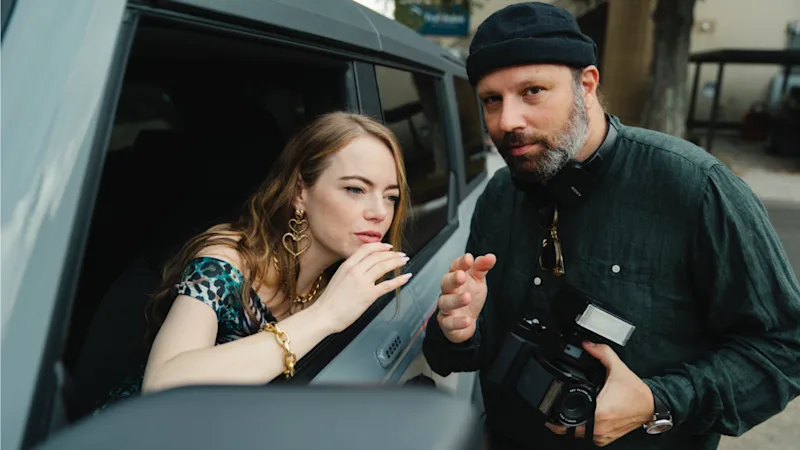Apropos of its subject, Maestro begins and ends with music. Bradley Cooper's drama about America's greatest composer starts with Leonard Bernstein conducting the New York Philharmonic in 1943, which launched him to fame, and climaxes with a bravura set piece in which he conducts Mahler's "Resurrection" Symphony at Ely Cathedral in 1973. In the film, the performance is presented in one six-minute take, with Cooper as Bernstein conducting the London Symphony Orchestra and a live choir in the actual cathedral.
While Cooper is center stage for the sequence, equally important is who was working behind the scenes. For Maestro, the filmmaker enlisted his Oscar-nominated sound team from his directorial debut, 2018's A Star Is Born, including production sound mixer Steve Morrow, supervising music editor Jason Ruder, and re-recording mixers Tom Ozanich and Dean A. Zupancic.
"I really enjoy working with this team," Morrow tells A.frame. "I'm usually the first one in the trench, and they're usually the last ones out."
The quartet were joined by Cooper's newest collaborator, sound designer and supervising sound editor Richard King, who is a four-time Oscar winner for his work on Master and Commander: The Far Side of the World (2003), The Dark Knight (2008), Inception (2010), and Dunkirk (2017). (He is also behind the sound on Christopher Nolan's latest film, Oppenheimer.) Although King was unable to participate in this roundtable about Maestro's sound, Zupancic says, "He got to experience it as the new person added to the crew, and he had a great experience. Bradley welcomed him and trusted his ideas."
A.frame: Was there anything you learned or felt like you mastered on A Star is Born that you wanted to replicate here? Or conversely, did Bradley come with new thoughts about how he wanted to approach the sound of this movie?
Steve Morrow: When he first came to me, he had said, 'Look, the success of A Star is Born was that it sounded real and authentic.' Tom, Dean, and Jason were able to bring that to that film, and we want to recreate that for Maestro. Let's try to record this stuff level. Let's get an orchestra and a choir and just have them do it live, because that's some of the secret sauce of the sound. That was what he brought from that original experience. And then keeping the team together, because now we all have a shorthand of what he likes, what he doesn't like, and that preference is part of his process, his magic.
Tom Ozanich: But the movies are pretty different. Like Steve is saying, there is this element of you definitely wanting it to feel real and authentic — those were things that were very important in both movies — but the music in this movie is almost like another character in the movie. That was a big thing that Bradley wanted was the presence of Leonard Bernstein through his music. So, the music is played differently than A Star is Born, where a lot of other things are bowing to the music. It's definitely a different feel, but it helped to have the knowledge of how he works.
Sound is always crucial to a film, but when it is as crucial to the film as it is here, how early on in the process are you coming in?
Jason Ruder: The first creative discussion was pretty much on the final dub of A Star is Born. Bradley was like, 'Hey, I want to do Bernstein, and what if we do the same methodology with a full orchestra?' And I was shocked. It was way more challenging to capture.
Morrow: I think we were all shocked.
Ruder: We were a little overwhelmed and realized the risk that everybody had to bite on to run with it. We had a lot of success doing live vocals and things on set with Star, but to take on something like Mahler with that many players and the chorus and the soloist and him conducting, it was like A Star is Born on steroids from a production standpoint.
Was there a particular sequence or aspect of the sound that was most difficult to get right?
Morrow: On the production side, Bradley had seen a movie that Jason Reitman directed a couple of years ago called The Front Runner, and he liked all the overlapping dialogue. He said, 'How did you do it?' And I said, 'We mic'd everybody. Everybody gets a mic and everybody talks.' And he clocked that and he said, 'Let's do that for the party scenes in this movie.' And that's how we approached it. My team, Jeanne [Gilliland] and John-Paul [Natysin], who are my people on set in New York, they had never mic'd that many people before, and they were kind of wide-eyed, like, 'And everybody's going to talk?!' Sure enough, take one comes around and I can't really hear what Carey [Mulligan]'s saying, and I go tell Bradley, and he goes, 'Well, go tell her to speak up.' And I went, 'You want me to tell her?' [Laughs] Okay, 'Hey, Carey. Bradley says I can tell you to speak up a little bit.' And she just looked at me and went, 'All right, sure.' I said, 'It's a loud party, you got to speak up over everybody else or we won't hear you.'
Do you know the most people you mic'd on one day?
Morrow: We were close to maybe 17 people mic'd and then a handful of plant mics here and there and a couple booms swinging around for the rest of them, which is large, but it's not huge. The Ely Cathedral had way more channels of audio, but not radio mic'd people.
Ruder: For music, the Ely Cathedral with Mahler was definitely the most challenging. I flew over to look at Ely with Bradley to do a tech scout. And I mean, it's beautiful, but it really was not an easy environment. The amount of cavern and verb, I was just thinking, 'How are we ever going to get a good recording in here?' That was challenge number one, and then we thought we had a mic strategy but Bradley wanted a cable camera running right through the middle. So, there was every risk you could imagine to capture it, and it was extremely expensive, so we had to convince the studio and producers and everybody to run with that. Because normally you would pre-record it, play it back, everybody would mime along, and that's how you would do it, and Bradley just wasn't going for it. He said, 'No, we gotta do this live.' I just remember thinking to myself, 'If this goes horribly wrong, I'm probably never going to work again. This is so expensive!' [Laughs]
So, it was stressful, but if anybody can take you there, Bradley can. And I've been on set with Steve, and he's the kind of guy who'll just roll with it. You just keep pushing and pushing and pushing, and he'll take the risk along with you. Same with Tom and Dean, they're always ready to take on any challenge, no matter how crazy it gets, and out-of-the-box ideas for production techniques. I've brought stuff to the stage with Tom that's coming in hot, god knows how we've recorded it or with what crazy methodology, and Tom is happy to dive in and get into the unknown and come up with something brilliant.
Steven and Jason, being there on set at Ely Cathedral, you're obviously worrying about your mics that day and the sound, but what was it like seeing Bradley do that performance live?
Morrow: Sheer and total panic. [Laughs] It was a joy to watch him do it, but the whole time you're just sitting there with every finger, every toe crossed. Because there's a lot on the backend, the technical side of it, and it's one of those things where you knew you were doing something special at the time you're doing it, but you were in such a mode of trying to just do it. We all understood what the goal was, and it was like, 'Don't fail me now, don't fail me now. Don't pass out, don't pass out.' And then when it was done, it was like, 'Oh, we're done? We're done-done? All right!'
Ruder: It's probably the most stressful day I've had in my career, and then we all gathered around and we watched the oner, and the feeling is hard to even describe. It was incredible, and Bradley actually turned around and said, 'This has been my most rewarding day ever shooting a movie.' I think everybody that was standing there in video village looking at the playback was just amazed and relieved and blown away.
Morrow: I think one of the symphony players ran over at the end and said, 'That was the one. Everything you did yesterday, it was close, but not quite right. But what you just did, that was the take,' and that's kind of where we stopped. Because that's the London Symphony Orchestra. These are guys that actually played with Bernstein years ago and came back to play in this movie, and they were floored at how authentic it was and how it made them feel again.
Ruder: Back on A Star is Born, Bradley had a video clip of the '73 performance, and he was like, 'I want to do this.' And I'm thinking, 'Great, we'll play back the orchestra and we'll probably do the two soloists live.' That was my gut instinct and that would have been challenging. But he was like, 'No, I want to do all of it live.' I ran home and rewatched Amadeus, which I hadn't seen in years, and I was like, 'Yeah, no.' I couldn't find a movie that tried to take on something like this with that much live music. It's never been done like that before.
Dean and Tom, after they've managed to pull this off, then it makes its way to you. What's it like collaborating with Bradley on the dub stage?
Ozanich: It's funny, the idea of the hardest thing, because in some ways, it's all hard. It's all a challenge. But we just love what we're doing, honestly, and love working together. This film has a lot of great stuff where, sound-wise, things are not necessarily played typically. One of the things we were always trying to do is think of the whole movie as a symphony. The whole movie has to be musical and have this flow, so it was a lot of fun to figure out how to make those ebbs and flows really work together and get from one scene to the other, or from color to black and white, and black and white to color, in a seamless way.
Dean A. Zupancic: There's so many aspects of the movie I love, but I love the transitions. I think one of the things that was tough is sound-wise, we're in 2023, so we're in Atmos and we're big and clear. But we also have to emulate 1943 and have to fit the picture, and that was a tough dance. We needed to be in Atmos, but the sound could never be bigger than the picture and it could never be bigger than the timeframe. So, all those beautiful costumes and all that great makeup, if we didn't do our jobs collectively and it took you out of the movie, all that would've been for naught.
Ozanich: When Bradley's with us, he just comes and he sits right in between Dean and I at the console, and we're all ultra-focused. There is not a single frame of this that we didn't pick apart and decide exactly what bird tweet is in what spot, and which syllable is clear enough or whatever. It's very much a team and he's right in there with us and one of us.
Ruder: Really, Bradley will dive into birds and trees just as deeper if not deeper than the music. Everything's got to coalesce in a really incredible fashion to just sing.
At this point, you all have had such prolific careers. Do you find that you're still learning on each job? If so, what did you learn or take away from Maestro?
Ozanich: I learn on most jobs, but I feel like I learn more working with Bradley. And it's not necessarily learning some sound doodad or whatever, it's more about the filmmaking process and what's going on in his head and talking to him about the choices that we're making and why we're going to do this or that. Getting that insight from somebody as unique as Bradley, who's writer, producer, director, actor on this thing, it's pretty unique. So, there's always something to really take from that.
Zupancic: And he's happy to share that filmmaker knowledge.
Morrow: He encourages it! He wants you to be a filmmaker with him. He doesn't want you to just do the job the same basic way you always do it. Some movies are that way, but his are not.
Zupancic: Bradley's in it with us, and we're in it with him. It's a tight-knit group. You're comfortable with each other. You get to bounce creative ideas off each other without feeling a insecure about it. He wants to hear your ideas. The dub stage is a lot different than production too, because it's even a tighter knit group of just us on stage, going through these scenes. Even acting motivation of why he did what he did in one scene or whatever. He'll share that with us. And it's like, 'Oh my gosh. Wow. We're getting a doctorate in filmmaking with his knowledge.'
By John Boone
RELATED CONTENT:
How Kazu Hiro Transformed Bradley Cooper Into Leonard Bernstein for 'Maestro' (Exclusive)
'The Context Is Everything': Behind the Sights and Sound of 'The Zone of Interest' (Exclusive)







